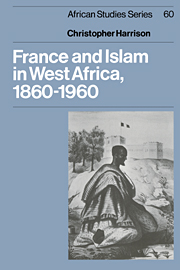Book contents
- Frontmatter
- Contents
- Acknowledgements
- Abbreviations
- Map
- 1 Introduction
- PART I 1850–1898: NINETEENTH-CENTURY ORIGINS OF FRENCH ISLAMIC POLICY
- PART II 1898–1912: THE FEAR OF ISLAM
- PART III FRENCH SCHOLARSHIP AND THE DEFINITION OF ISLAM NOIR
- PART IV 1920–1940: THE FRENCH STAKE IN ISLAM NOIR
- Introduction
- 8 Post-war attitudes to Islam
- 9 The French stake in Islam
- 10 The ‘rediscovery’ of Islam
- 11 Epilogue 1940–1960
- 12 Conclusion
- Notes
- Bibliography
- Index
- Frontmatter
- Contents
- Acknowledgements
- Abbreviations
- Map
- 1 Introduction
- PART I 1850–1898: NINETEENTH-CENTURY ORIGINS OF FRENCH ISLAMIC POLICY
- PART II 1898–1912: THE FEAR OF ISLAM
- PART III FRENCH SCHOLARSHIP AND THE DEFINITION OF ISLAM NOIR
- PART IV 1920–1940: THE FRENCH STAKE IN ISLAM NOIR
- Introduction
- 8 Post-war attitudes to Islam
- 9 The French stake in Islam
- 10 The ‘rediscovery’ of Islam
- 11 Epilogue 1940–1960
- 12 Conclusion
- Notes
- Bibliography
- Index
Summary
Advertisements appearing in the monthly journal L'Afrique Française remained virtually unchanged in the first twenty years of the journal's existence: champagne with corks for tropical climates, special tents and pills to cure constipation (and worse) were all constant features of the curious epoch of French colonialism in the first two decades of the twentieth century. However, by the early 1920s the tents and pills had made way for banks, theodolites and drawing boards. (The champagne, however, survived.) This change clearly reflected the increasing popularity of the idea of La mise en valeur des colonies associated particularly with the post-war Minister of Colonies, Albert Sarraut. The use of colonial soldiers during the First World War had indicated the economic potential of the colonies, and the financial ruin and social hardship which France experienced immediately after the war gave added urgency to the need to exploit the economic potential of her overseas Empire. The war had helped France both to understand and to define her colonial mission – and the itinerant adventurer with his tents and pills was transformed as a result into the rather more permanent figure of draughtsman and engineer planning the rational exploitation of Africa's wealth.
- Type
- Chapter
- Information
- France and Islam in West Africa, 1860–1960 , pp. 139 - 143Publisher: Cambridge University PressPrint publication year: 1988

